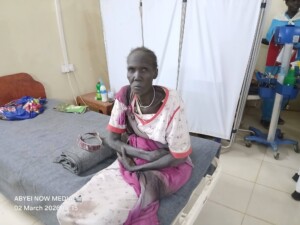Sudan prosecutors summon five more journalists over meeting with EU, US diplomats
On Wednesday, five journalists appeared before the State Security Prosecution in the Sudanese capital of Khartoum after being summoned on Monday following their meeting with ambassadors of EU missions and the US Charge d’Affaires in October.

On Wednesday, five journalists appeared before the State Security Prosecution in the Sudanese capital of Khartoum after being summoned on Monday following their meeting with ambassadors of EU missions and the US Charge d’Affaires in October.
Bahram Abdelazim, a journalist for El Yowm El Tali told Radio Dabanga that said the list of journalists who received summonses included his himself, Khalid Abdelaziz, a Reuters reporter, Shogi Abdelazim, a Sudanese Satelite24 journalist, Hussein Saad, and Abdelgadir Mohamed.
He explained that the summons for the purpose of conducting investigations on their meeting with ambassadors, which dealt with the issues of press freedoms in Sudan in a natural context.
The prosecution conducted investigations with five journalists earlier for the same reason, including Osman Mirghani, Ashraf Abdelaziz, Lina Yagoub, Maha El Tilib, and Shamayel El Nour.
Convicted journalist released
On Monday evening, the Press Court released journalist Zeinelabdin El Ajab, the former editor of El Mustagilla, after a fine of SDG5,000 ($178*) was paid by his colleagues.
On Monday, the Press Court presided over by Judge Salah Saeed, sentenced El Ajab to one and a half months in prison or a fine of SDG5,000. The former editor-in-chief was immediately transferred to prison. He was convicted for two reports that were published in El Mustagilla newspaper.
El Ajab told Radio Dabanga after his release that he would have preferred to stay in prison for a month and a half instead of paying the fine, but that colleagues intervened paid the fine which led to his release.
He explained that there are problems related to the functioning of the court is the refusal to listen to witnesses such as the American Charge d’Affaires, the Egyptian Ambassador, and the Minister of Foreign Affairs in addition to the length of the trial.
He told Radio Dabanga that the charges were related to reports published in El Mustagilla newspaper during his tenure as editor-in-chief concerning the alleged burial of nuclear waste in the Merowe area and a report on a Sudanese country agreement to support the Ethiopian Renaissance Dam, allegedly in order to harm Egypt.
Abuse in custody
He accused the security services of targeting him, pointing out that he had subjected to earlier imprisonment for five days during which he was beaten with whips, chains and verbal abuse before being released after paying a fine of SDG15,000 ($315).
Yesterday, the Press and Publications Court issued a ruling on the acquittal of the Sudanese Baath newspaper and its editor-in-chief Mohamed Dia in complaint 91/2017 filed by the National Intelligence and Security Service on charges of defamation and threatening public peace.
The newspaper published a news report that the NISS seized a government piece of land on the Nile shore and built a club for more than $70 million which is considered an infringement on the Nile and violation of the law.
Ongoing media curbs
The Media in Sudan are continuously subjected to confiscations of newspapers, and summons and detentions of journalists.
In the end of June, the cabinet extended the power of the government-controlled Press and Publications Council as well as restrictions on the media to online news outlets, when it passed amendments of the Media and Publication Act. A month later, the NISS restored prior-censorship of newspapers.
In early August, editors-in-chief and the head of the NISS in Khartoum agreed in a meeting to form a committee to deliberate on the so-called red lines set by the security apparatus for Sudanese media. New confiscations of newspapers were therefore briefly suspended.
However, the NISS began gagging the press again on August 27, when the print-runs of El Jareeda and El Tayyar were confiscated. No explanations were given. Four days later, NISS officers stopped the distribution of El Jareeda and El Tayyar again, together with the print-run of El Rai El Aam, without stating a reason.
Abdelaziz told Radio Dabanga at the time that “in the past there used to be ‘red lines’ not to criticise the president or vice-presidents of Sudan, members of the security apparatus, and the police. However, these lines have become very unclear and unpredictable now”.
In early September, three young journalists were summoned by security agents in Khartoum and El Gedaref. A Sudanese reporter was banned from writing. The print-run of El Saiha daily, the newspaper he was writing for, was confiscated on September 8.
Sudan is ranked at the bottom of the World Press Freedom Index by Reporters Without Borders.
* Based on the daily US Dollar rate quoted by the Central Bank of Sudan (CBoS)











 and then
and then